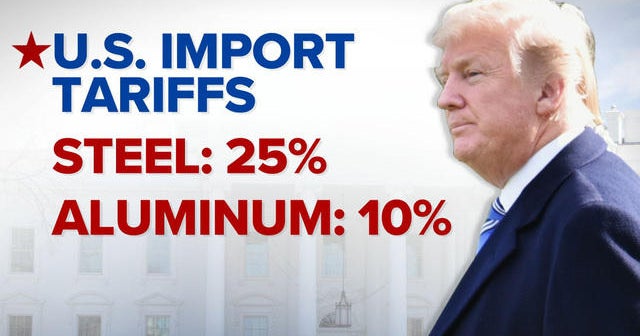Dow's $9B Alberta Project Delayed: Collateral Damage From Tariffs

Table of Contents
The Impact of Tariffs on Dow's Alberta Project
The imposition of tariffs has had a profound and multifaceted impact on the feasibility and timeline of Dow's Alberta Project. The increased costs, financing difficulties, and regulatory uncertainties created by these trade barriers have conspired to create a perfect storm of challenges.
Increased Costs of Materials
Tariffs on imported raw materials and equipment have significantly inflated the project's budget. The increased cost of essential inputs has created a substantial burden, jeopardizing the project's financial viability.
- Steel: Tariffs on imported steel, a critical component in large-scale construction projects like this, have led to a substantial price increase.
- Plastics: Similarly, tariffs on imported plastics and related polymers, essential for Dow's petrochemical operations, have driven up costs.
- Specialized Equipment: The importation of specialized machinery and equipment required for the project has also been affected by tariffs, adding significantly to the overall expenditure.
Estimates suggest that the tariffs have contributed to a 15-20% increase in the overall project costs, a staggering sum considering the project's already substantial budget. Furthermore, these tariffs have disrupted supply chains, leading to delays and potential shortages of essential materials.
Financing Challenges
The escalating costs, directly attributable to tariffs, have created significant challenges in securing the necessary funding for Dow's Alberta Project. The increased risk profile associated with the project's inflated budget has made it more difficult to attract investors and secure loans from financial institutions.
- Investor Hesitation: The uncertainty surrounding the project's financial viability, directly linked to the unpredictable nature of tariffs, has made potential investors hesitant to commit capital.
- Loan Approvals: Securing loans at favorable rates has become more difficult, as lenders assess the increased risk associated with the project's inflated budget and potential for further cost overruns due to ongoing tariff uncertainty.
- Dow's Investment Strategy: This setback could significantly alter Dow's overall investment strategy and potentially lead to a reassessment of future large-scale projects in regions susceptible to trade disputes.
Regulatory Uncertainty
The imposition of tariffs has also created regulatory uncertainty, potentially leading to further delays in securing the necessary permits and approvals. The added complexity and bureaucratic hurdles associated with tariff-related paperwork and negotiations add to the overall project timeline.
- Environmental Impact Assessments: Navigating the environmental review process has become more complex, with added paperwork and potential delays due to the evolving landscape of trade regulations.
- Permitting Processes: Securing other necessary permits and approvals has also been slowed by the added regulatory complexities associated with tariff-related issues.
- Negotiations with Government Agencies: The need for ongoing negotiations with government agencies to address tariff-related issues has further contributed to the project delays.
Wider Economic Implications of the Delay
The delay of Dow's Alberta Project has far-reaching economic consequences that extend beyond the immediate impact on Dow Chemical itself. The ripple effects are felt throughout the Alberta economy and have implications for global trade dynamics.
Job Creation Losses
The postponement of the project translates to significant job losses in Alberta. These losses encompass construction jobs, operational roles within the facility, and the knock-on effects on related industries.
- Direct Job Losses: Thousands of jobs, initially projected to be created during the construction and operational phases, are now at risk or delayed indefinitely.
- Indirect Job Losses: The delay also impacts related industries – suppliers, transportation, and support services – resulting in further job losses throughout the Alberta economy.
- Economic Impact on Alberta Communities: The lost economic activity associated with these job losses will have a significant impact on Alberta communities and their related industries.
Impact on Petrochemical Industry in Alberta
The delay of Dow's Alberta Project has a substantial ripple effect on Alberta's petrochemical industry. The project's postponement casts a shadow on investor confidence and hinders the province's competitiveness in the global petrochemical market.
- Reduced Investment: The delay may deter future investment in Alberta's petrochemical sector, as investors weigh the risks associated with trade disputes and regulatory uncertainties.
- Supplier Impacts: Suppliers and related businesses that had anticipated partnerships with the project now face reduced demand and potential financial hardship.
- Global Competitiveness: Alberta's competitiveness in the global petrochemical market is diminished, as the delay highlights the instability and uncertainty associated with operating in a volatile trade environment.
Global Implications of Trade Wars
Dow's Alberta Project serves as a stark example of the detrimental consequences of escalating trade conflicts and protectionist policies. This case study underscores the broader implications of trade wars on global investments and economic growth.
- Reduced Global Investment: Uncertainty created by trade wars discourages multinational corporations from making large-scale investments, hindering economic development worldwide.
- Supply Chain Disruptions: Tariffs disrupt global supply chains, leading to increased costs, delays, and reduced efficiency.
- Retaliatory Measures: Trade wars often lead to retaliatory measures, creating a downward spiral that harms all participants.
Conclusion: The Future of Dow's Alberta Project and the Need for Trade Stability
The delay of Dow's Alberta Project underscores the devastating impact of tariffs on large-scale investment projects. The significant financial losses, job losses, and broader economic repercussions highlight the urgent need for greater trade stability and predictability. This $9 billion setback serves as a stark warning of the consequences of protectionist policies. The future of Dow's Alberta Project, and countless other similar ventures, hinges on fostering a stable and predictable trade environment. We urge readers to advocate for fair trade policies that support large-scale projects like Dow's Alberta Project, engaging with policymakers and emphasizing the importance of responsible and transparent trade practices. Only through a commitment to collaborative and predictable trade relationships can we prevent future instances of such detrimental delays and protect economic growth globally. Let's work together to ensure that projects like Dow's Alberta Project can thrive, creating jobs and prosperity without the crippling uncertainty caused by unpredictable tariffs.

Featured Posts
-
 Louisiana Judge To Decide Fate Of Harvard Researcher Facing Russian Deportation
Apr 28, 2025
Louisiana Judge To Decide Fate Of Harvard Researcher Facing Russian Deportation
Apr 28, 2025 -
 Pirates Edge Yankees After Extra Innings Walk Off Win
Apr 28, 2025
Pirates Edge Yankees After Extra Innings Walk Off Win
Apr 28, 2025 -
 Starbucks Union Spurns Companys Wage Increase Proposal
Apr 28, 2025
Starbucks Union Spurns Companys Wage Increase Proposal
Apr 28, 2025 -
 Trump And Zelenskys Surprise Meeting Before Popes Funeral
Apr 28, 2025
Trump And Zelenskys Surprise Meeting Before Popes Funeral
Apr 28, 2025 -
 V Mware Costs To Skyrocket 1 050 At And T Sounds Alarm On Broadcom Deal
Apr 28, 2025
V Mware Costs To Skyrocket 1 050 At And T Sounds Alarm On Broadcom Deal
Apr 28, 2025
Latest Posts
-
 Red Soxs Shifting Lineup Impact Of Outfielders Return And Casas Lowered Spot
Apr 28, 2025
Red Soxs Shifting Lineup Impact Of Outfielders Return And Casas Lowered Spot
Apr 28, 2025 -
 Analysis Red Sox Lineup Changes Following Outfielders Return And Casas Demotion
Apr 28, 2025
Analysis Red Sox Lineup Changes Following Outfielders Return And Casas Demotion
Apr 28, 2025 -
 Updated Red Sox Lineup Casas Position Change And Outfielders Reinstatement
Apr 28, 2025
Updated Red Sox Lineup Casas Position Change And Outfielders Reinstatement
Apr 28, 2025 -
 Red Sox Lineup Outfielder Returns Casas Moves Down In The Order
Apr 28, 2025
Red Sox Lineup Outfielder Returns Casas Moves Down In The Order
Apr 28, 2025 -
 Triston Casas Continued Slide Red Sox Lineup Adjustment And Outfielders Return
Apr 28, 2025
Triston Casas Continued Slide Red Sox Lineup Adjustment And Outfielders Return
Apr 28, 2025
